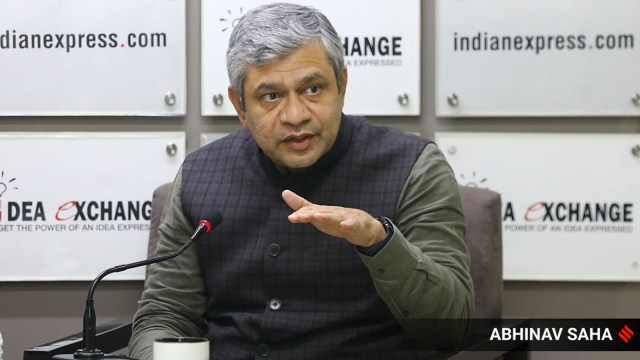Ahead of Lok Sabha polls, IT Minister Ashwini Vaishnaw flags social media influence on ‘democratic processes’
Highlighting that social media platforms today follow their own content moderation policies and also deploy algorithms that dictate the prominence content pieces get, Vaishnaw questioned whether “safe harbour” should continue to exist in the way it was originally envisaged.
 Union Minister of Communications, IT and Railways, Ashwini Vaishnaw at The Indian Express Idea Exchange event on Tuesday. (Express Photo: Abhinav Saha)
Union Minister of Communications, IT and Railways, Ashwini Vaishnaw at The Indian Express Idea Exchange event on Tuesday. (Express Photo: Abhinav Saha)Flagging concerns regarding the “influence” that social media platforms can have on democratic processes, Union Minister of Communications, IT and Railways, Ashwini Vaishnaw, said that while India currently has a regulatory framework that can deal with the issue to an extent, a “much more comprehensive legal structure” was needed.
Speaking at The Indian Express Idea Exchange event on Tuesday, Vaishnaw also emphasised that the context in which legal immunity from third party content — or “safe harbour” protection — was offered to social media platforms has “changed”, and there is a need for these platforms to be subjected to increased accountability.
Vaishnaw’s comments are significant as India heads towards general elections over the next few months.
“All over the world, democracies are worried about the influence of social media on democratic processes. Especially after the developments around Artificial Intelligence (AI), people are really concerned about their impact on democracies,” Vaishnaw said.
“The promise of social media was that everybody gets a voice, a platform on which opinions can be expressed and it was not like traditional media where editorial control can keep some opinions out. That promise had an inherent understanding that whoever is publishing views on social media would also be accountable for it, be cognisant of the legal structure, social realities and ensure that nobody else is hurt. Unfortunately, that part has deteriorated over a period of time, and today’s social media has become a free-for-all where anyone can write anything derogatory about anybody else,” he said.
Vaishnaw said a number of countries have had to take steps to contain the problem, and India faces a similar challenge.
“We are also facing that challenge. We have a legal structure which addresses some of the concerns to some extent, but, definitely, we need a much stronger and much more comprehensive legal structure. There has to be some judgement on what is right and wrong. There has to be some sort of accountability, both of the platforms and users,” he said.
Highlighting that social media platforms today follow their own content moderation policies and also deploy algorithms that dictate the prominence content pieces get, Vaishnaw questioned whether “safe harbour” should continue to exist in the way it was originally envisaged.
“Earlier, the context (for safe harbour) was that the Internet was emerging, it was totally new. It was starting to come out of laboratories and universities to the general public. At the time, the people who wanted to take the Internet to the public sought to limit their liability for content for which they were not responsible,” Vaishnaw said.
“Today, the context has completely changed. Which platform doesn’t moderate content today? Every platform does it. They do it according to their own wishes, it is not as per the law, but according to their own policies. The investment they make in content moderation is different in different geographies, depending on their own priorities,” he said.
He also questioned whether the use of algorithms to distribute content on social media platforms was “equitable”.
“Once you say an algorithm will decide what is going to be seen, is that equitable? It is not equitable. You are not actually seeing what you want to see, you are consuming the content which the algorithm wants you to consume. It is not a mere chance that you are getting a video which you thought you should see. It is a pure mathematical algorithm which is defining your life today,” he said.
“So, when the platform is no longer a platform in the true sense, should the safe harbour be a safe harbour in the original sense? That’s my question,” Vaishnaw added.







